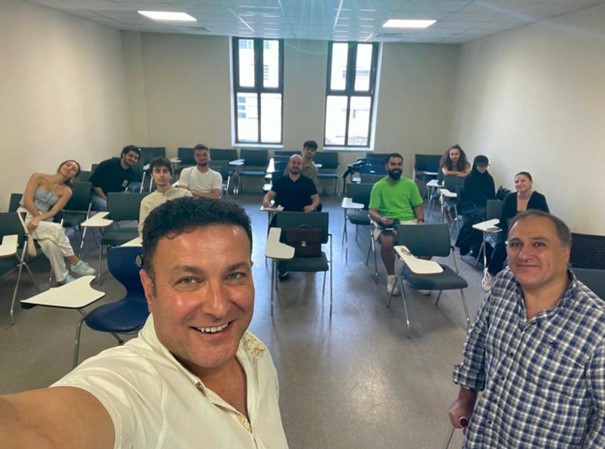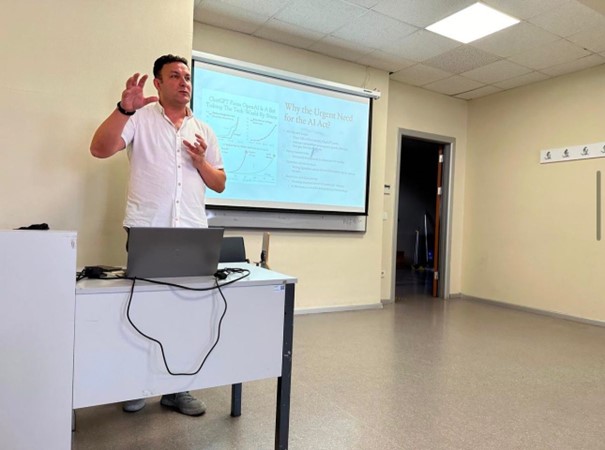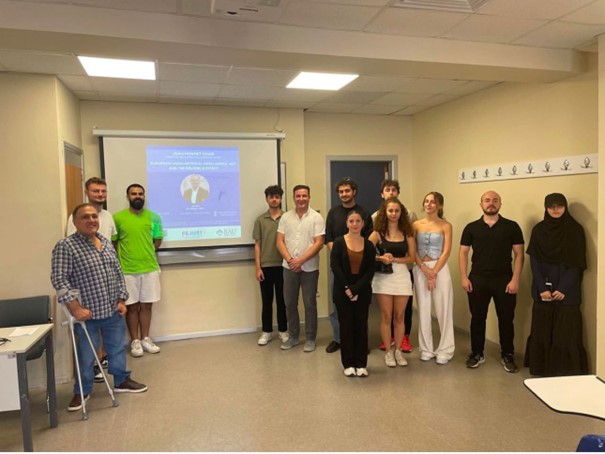Title: European Union Artificial Intelligence Act and the Brussels Effect
Date: July 26, 2024
Speaker: Dr. Ethem İlbiz (University of South Wales)
Venue: Bahçeşehir University, Classroom B405
Moderation: Dr. Zekeriya Tüzen

On July 26, 2024, the Jean Monnet Chair on Feminist Epistemic Justice in the EU and Beyond (FEJUST) hosted Dr. Ethem İlbiz, a distinguished researcher from the University of South Wales, for an in-person seminar on the European Union Artificial Intelligence Act and the Brussels Effect. This timely presentation explored the EU’s role as a global regulatory superpower in the field of artificial intelligence (AI) and the implications of its Artificial Intelligence Act (AIA) on international markets, policy frameworks, and societal norms.
The seminar was attended by academics, students, and practitioners from diverse fields, fostering an interdisciplinary discussion on the regulatory, ethical, and socio-political dimensions of AI governance. Dr. İlbiz’s presentation provided a nuanced understanding of how the EU's approach to regulating AI extends its influence far beyond its borders, shaping global standards through the “Brussels Effect.”
About the Speaker:
Dr. Ethem Ilbiz is a Senior Research Fellow at the University of South Wales' International Centre for Policing and Security. His areas of research interest are diverse and include cybercrime, public-private partnerships, sharing economy, disruptive technologies (especially encryption and blockchain), Turkish politics, and counter-terrorism. In recent years, Dr. Ilbiz has focused his research on the adaptability of the sharing economy as a new public-private partnership model. He is particularly interested in whether online platforms can be used as innovative solutions to fill resource gaps in public administrations. His research has shed light on the potential benefits and drawbacks of sharing economy platforms intermediated by public administrations, and he is widely regarded as one of the experts in this field. Dr. Ilbiz provides consultancy services in his areas of expertise and also supervises postgraduate students who are interested in working in these research areas.
Overview of Presentation:
Dr. İlbiz began by contextualizing the European Union’s Artificial Intelligence Act as a pioneering legislative framework designed to address the opportunities and risks associated with AI technologies. He explained that the AIA categorizes AI systems based on their risk levels—ranging from minimal to unacceptable—and sets specific obligations for each category. These include transparency, accountability, and risk mitigation requirements to ensure ethical AI use.
A central theme of the presentation was the concept of the Brussels Effect, wherein the EU’s stringent regulatory standards are adopted globally due to its economic clout and access to its vast internal market. Dr. İlbiz illustrated how the AIA has the potential to influence not only EU member states but also global technology developers and policymakers, setting de facto international norms for AI governance. This extraterritorial regulatory impact, he argued, is a hallmark of the EU’s normative power in the global arena.
Dr. İlbiz also highlighted the socio-political implications of the AIA, particularly its focus on safeguarding fundamental rights. By addressing concerns such as algorithmic bias, data privacy, and discrimination, the AIA positions itself as a tool for promoting fairness and inclusivity in AI development and deployment. He discussed specific examples of how biased AI systems, particularly in areas like recruitment, policing, and healthcare, disproportionately harm marginalized communities, including women and minorities.
The presentation concluded with a discussion on the challenges and opportunities of implementing the AIA, including the need for capacity-building among regulators, the risk of stifling innovation, and the importance of international collaboration to harmonize AI standards.
Relevance for Feminist Epistemic Justice in the EU and Beyond
Although the seminar’s primary focus was on AI regulation, its themes resonate deeply with the mission of FEJUST, which aims to address epistemic injustices and amplify marginalized voices in policymaking. The gendered and intersectional implications of AI systems, particularly in perpetuating biases and inequalities, are pressing issues that require urgent attention. The seminar highlighted how feminist epistemic perspectives can contribute to the ethical design, deployment, and regulation of AI by emphasizing the inclusion of diverse voices in these processes.
Dr. İlbiz’s discussion on the EU’s role in setting global AI standards aligns with FEJUST’s commitment to promoting inclusive governance models that prioritize equity and justice. By hosting this seminar, FEJUST underscored the importance of integrating feminist insights into AI governance, advocating for policies that address systemic inequalities and promote ethical innovation.
The seminar concluded with a lively Q&A session, where participants raised questions about the practical challenges of implementing the AIA, the role of civil society in monitoring AI governance, and strategies for mitigating algorithmic bias. Attendees also discussed how the Brussels Effect could influence countries outside the EU, particularly in regions with limited regulatory capacity.




The event emphasized the interdisciplinary nature of AI governance, encouraging collaboration among legal experts, technologists, social scientists, and policymakers to ensure that AI serves the interests of all, rather than perpetuating existing inequalities. It was attended by 15 participants.
The seminar with Dr. Ethem İlbiz provided an insightful analysis of the EU’s Artificial Intelligence Act and its global impact through the Brussels Effect. By connecting the themes of AI governance with the goals of feminist epistemic justice, the event highlighted the importance of inclusive and equitable regulatory frameworks in addressing the societal implications of emerging technologies. Hosted by FEJUST, this seminar exemplified the Chair’s commitment to fostering critical discussions on the intersection of technology, policy, and justice in the EU and beyond.